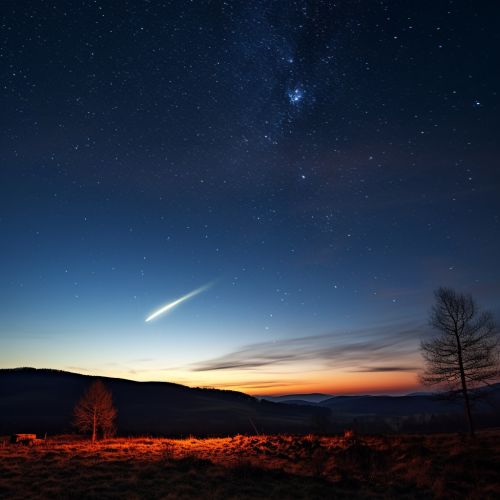Impact event
Introduction
An impact event is a collision between celestial bodies causing measurable effects. Impact events have physical consequences and can have dramatic effects on the natural environment and life on a planet, particularly if that planet is Earth.
Celestial Bodies Involved
Impact events typically involve a large scale collision between two celestial bodies. The larger body is usually a planet or a moon, while the smaller one can be an asteroid, a comet, or a meteoroid. The smaller body, often referred to as a meteoroid, becomes a meteor when it enters the Earth's atmosphere and begins to burn up. If it survives its passage through the atmosphere and lands on Earth, it is then classified as a meteorite.


Physical Consequences
The physical consequences of an impact event can vary greatly depending on the size, speed, and composition of the impacting body, as well as the location of impact. These can range from minor atmospheric disturbances to cataclysmic events that cause mass extinctions.
Crater Formation
One of the most immediate and noticeable effects of an impact event is the creation of a crater. The size of the crater is typically many times larger than the size of the impacting body. The energy released upon impact vaporizes the meteorite and a large amount of the target area, creating a shock wave that excavates a large cavity.
Shock Waves and Ejecta
The impact of a celestial body with a planet or a moon not only creates a crater but also generates shock waves that can cause damage far beyond the impact site. The material that is ejected during the impact, known as ejecta, can be thrown for many kilometers, blanketing the surrounding area and causing secondary impacts.
Atmospheric and Climatic Effects
Large impact events can have significant effects on the planet's atmosphere and climate. The impact can cause a dust cloud that can block sunlight, leading to a drop in temperature, a phenomenon known as an impact winter. This can lead to long-term climatic changes and can have severe consequences for life on the planet.
Historical Impact Events
Throughout Earth's history, there have been several significant impact events. These events have had profound effects on the Earth's environment and its life forms.
Chicxulub Impact
The Chicxulub impact, which occurred approximately 66 million years ago, is the most famous impact event, as it is widely believed to have caused the extinction of the dinosaurs. The impact created a crater over 180 kilometers in diameter in what is now the Yucatán Peninsula in Mexico.
Tunguska Event
The Tunguska event, which occurred in 1908 in Siberia, Russia, is the largest impact event on Earth in recorded history. The explosion, caused by a meteor burst in the atmosphere, flattened 2,000 square kilometers of forest but did not cause any known human casualties.
Impact Event Detection and Prevention
Modern technology allows us to detect potential impact events before they occur. Organizations such as NASA's Near-Earth Object Observations Program are dedicated to finding and tracking asteroids and comets that could potentially impact Earth.
In the event that a potential impact is detected, there are several proposed methods to prevent the impact, such as deflecting the asteroid or comet. However, these methods are still largely theoretical and untested.
